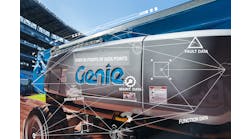In RER’s July issue, we interviewed software providers about how the cloud computing concept continues to penetrate the rental industry, and have been reprinting them over the past few weeks in RER Reports. In this interview, Chris Branson, CEO, and Olly Williamson, senior business development manager, inspHire, talk to RER managing editor Brandey Smith about the challenge of security the cloud must overcome, the economical and logistical benefits that a cloud-based platform provides, and the benefits of providing real-time information to customers.
RER: The cloud computing concept has steadily grown as its benefits become more apparent to businesses and individuals alike. Do you think the popular release of Apple’s iCloud will further enhance awareness of the cloud computing concept and make offsite storage of data more comfortable for rental business owners?
Branson: Cloud computing had been with us for some time, many do not realize they have been using it. Cloud storage, such as Apple's iCloud, has recently become much more affordable for both businesses and individuals alike and we see this type of product sharply rising in popularity and usage over the next 12 months. There is no doubt that the move to the cloud is in full swing and Apple's high-profile launch of iCloud will undoubtedly raise awareness across the business spectrum.
The one challenge that the cloud needs to overcome is security. Most of the modern cloud applications available today are secure and robust — the recent attacks on high-profile companies are, in the main, taking advantage of older technology weaknesses and/or poorly designed security. Anyone looking to use cloud applications needs to review the security offered from the provider to make sure it's fit for purpose.
Does Apple’s iCloud offering mean that smaller rental businesses with fewer locations will soon be best served by utilizing a similar cloud model for their software implementation and data storage?
Branson: In a word, yes. The economical and logistical benefits that a cloud-based platform provides will allow smaller businesses to become even more agile in changing market conditions. Need a new temporary outlet? No problem. Need additional user licences during the busy season? Done. Need to move locations without the IT hassle? You got it. Need to downscale your system? Click and it's done. Want full mobile access to your systems wherever you are? Easy.
There are already a wide range of cloud-based offerings that are relevant and useful to all types of business, not just rental. A mature offering is Google's Application suite. Does this allow small businesses to lower their IT costs and support their businesses no matter where their staff is? Yes, it does. Are other business applications being developed for small business in the cloud? You can bank on it. There are a huge range of business applications out there in the cloud today that small businesses can take advantage of right now — accounting, project management, sales & marketing, customer support, reporting, data analysis, off-site backup, document sharing, and document management are just the tip of the iceberg.
The next 12 to 24 months are going to be exciting times in the cloud arena — the platform is maturing rapidly, the products being offered today are prolific and growing fast. Small businesses will be the biggest winners in this drive to cloud computing as they are natural early adopters, but don't hang about too long, the corporate [businesses] won't be too far behind.
Explain how all the outside data management that the cloud provides will affect a rental business’ IT costs. How much of an annual savings do you think a small- to medium-sized rental business might expect to achieve when it no longer requires onsite IT personnel?
Williamson: This is a tough one to answer. For example, why does a move to cloud necessitate a reduction in onsite personnel? Moving your IT to the cloud gives flexibility. It can give you known, manageable monthly IT costs. It could take away the hassle of financing and managing an IT infrastructure. It may open up a new range of software offerings, many of which are ground up redesigns taking advantage of modern browser technology and new thinking on productivity software. The range of savings available to a business moving into the cloud will vary dependent on its size, how much of its IT provision it moves and its own current circumstances in terms of IT support, head count, etc.
Many rental management solutions providers tout their superior customer support capabilities. How important is customer support to consider when selecting a new software provider?
Williamson: The support of the product is invaluable as it is essentially the customers’ insurance against problems that can affect its software. Often software support is seen as simply the Helpdesk but customer support is really so much more. inspHire’s Customer Care Plus package includes the Helpdesk support but also key elements such as customer account management, an online Help File and regular software updates. Whether it’s keeping the software up-to-date with legislation changes, adding new features, or keeping our knowledge-based documents current and relative, or simply having the right people on the telephone for when customers need our help — all of these aspects help us to provide the best possible customer service. In addition it protects the customer when they have issues with their software such as power outages or server issues causing data corruption, as well as helping to reinstall software after a hardware crash.
Describe the very latest technologies that rental businesses are benefiting from both in terms of hardware equipment/devices and software features. What do you see coming?
Williamson: inspHire WebPortal provides the means for rental companies to service their own customers 24/7, giving them access to their own account information anytime, anywhere in the world from laptops, tablets and smartphones enabling them to reduce admin costs and helping them to provide better service. inspHire has also recently launched its iPhone /iPad application, inspHire-iX, giving key customer information to inspHire users on the move. Mobile technology gives rental companies access to key customer information when they need it — whether they are on site or in the office.
Explain how software is developed so that it not only meets a rental company’s current business needs, but is equipped to grow as the business continues to grow.
Williamson: inspHire focus groups and user forums give customers the opportunity to have a say in what they would like to see in the software and how they would like to see the product moved forward. inspHire has a strong, experienced development team that is constantly updating its skill set to keep pace with the latest programming developments, constantly assessing and updating our packages, creating new builds regularly as we keep pace with the latest innovations and industry trends. The inspHire family of products is designed to be continuously upgraded and added to as the needs of the rental company change.
What advice would you give to rental businesses that are still using relatively out-of-date legacy software systems that don’t offer the latest integrations and efficiencies?
Williamson: Legacy systems frequently do not allow for the same kind of flexibility offered by products offered in today's market place. Rental businesses want to see real-time information delivered to them in different ways as well as being able to offer their own customers access to the same information. Many rental companies are now looking at implementing strong ERP systems to run the back-office accounting function such as MS Dynamics GP, NAV, SAP, and more, and integrating to them with a Windows application is so much easier.




